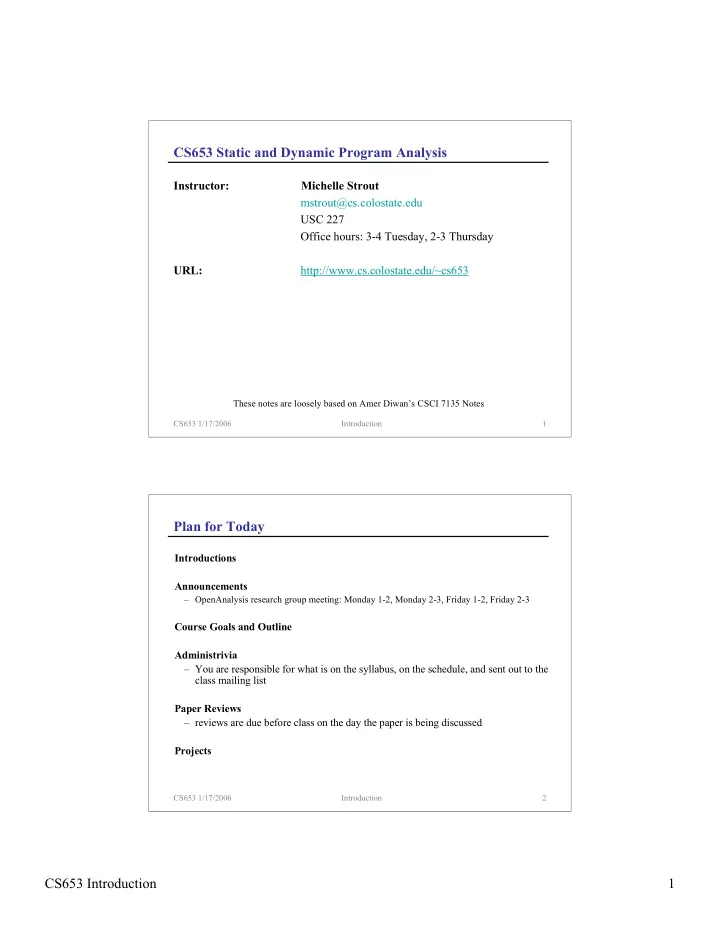

CS653 Static and Dynamic Program Analysis Instructor: Michelle Strout mstrout@cs.colostate.edu USC 227 Office hours: 3-4 Tuesday, 2-3 Thursday URL: http://www.cs.colostate.edu/~cs653 These notes are loosely based on Amer Diwan’s CSCI 7135 Notes CS653 1/17/2006 Introduction 1 Plan for Today Introductions Announcements – OpenAnalysis research group meeting: Monday 1-2, Monday 2-3, Friday 1-2, Friday 2-3 Course Goals and Outline Administrivia – You are responsible for what is on the syllabus, on the schedule, and sent out to the class mailing list Paper Reviews – reviews are due before class on the day the paper is being discussed Projects CS653 1/17/2006 Introduction 2 CS653 Introduction 1
Course Goals Understand two big picture problems – program optimization – security In depth knowledge of program analysis ranging – from entirely at compile-time – to run-time – to post run-time – to barely any analysis at all. How these program analyses are applied to program optimization and security Approach – read and critique recent and influential papers – implement a program analysis idea CS653 1/17/2006 Introduction 3 Other Important Course Goals Research Exam Preparation – paper reviewing skills will be critical for the research exam – presenting the crucial points in a paper – synthesizing ideas between papers – suggesting future research questions Thesis Project Preparation – how to break projects into manageable pieces – how to leverage existing research tools – presenting research in a succinct fashion CS653 1/17/2006 Introduction 4 CS653 Introduction 2
Compile-time Program Analysis Discover properties of programs by looking at its source – local (a few lines of straight-line code) – global or intraprocedural (full procedure) – interprocedural (several procedures) – special case: whole program analysis CS653 1/17/2006 Introduction 5 Example of Compile-time Program Analysis What are the possible values of y? Does answering this question require local, global, or interprocedural analysis? CS653 1/17/2006 Introduction 6 CS653 Introduction 3
Run-time Program Analysis Discovers properties of programs by examining its runs CS653 1/17/2006 Introduction 7 Example of Run-time Program Analysis What is the most common target of o.m()? What can we do with that information? CS653 1/17/2006 Introduction 8 CS653 Introduction 4
Outline Read papers that use a range of static and analysis techniques to solve the problems that arise in program optimization and program security – data-flow analysis as a static analysis framework – relationship between data-flow analysis and abstract interpretation – applying data-flow analysis to security – dealing with pointers – other ways to improve analysis precision (context, flow, and path sensitivity) – staged and dynamic analysis – profiling to feed back into static analysis – when data-flow analysis is not enough – static and dynamic data dependence analysis – don’t analyze, just generate code CS653 1/17/2006 Introduction 9 Administrative Matters Turn to your syllabus CS653 1/17/2006 Introduction 10 CS653 Introduction 5
Tips for Reading a Research Paper (by Tia Newhall) Read the paper three times – First read the abstract, introduction, related work, and conclusion – Next read the entire paper writing down questions and vocabulary words you need to look up – Finally re-read the paper critically, answer the paper review questions Questions to answer in a paper review – What problem did the paper address? – Is it important/interesting? What was the context for the paper? – What is the approach used to solve the problem? – How does the paper support or otherwise justify the conclusions it reaches? – What problems are explicitly or implicitly left as future research questions? CS653 1/17/2006 Introduction 11 Selecting a Paper to Present Read the abstract, introduction, and conclusion for all papers you are seriously considering Consider selecting a paper related to your course project Schedule around your deadlines in this course and other courses Paper selection will be first-come-first-serve – I will start posting assignments as soon as they are sent – You must indicate which paper you would like to present by January 26 – There are 21 possible papers, don’t panic! CS653 1/17/2006 Introduction 12 CS653 Introduction 6
Project Five deliverables – proposed tool example with preliminary project proposal – proposal and tool example – verbal status report (15 minutes) – intermediate report – final report and elevator speech Possible projects accessible from colostate.edu CS653 1/17/2006 Introduction 13 Tool Example C-breeze – last semester wrote a walker that counted operations in the program LLVM compiler infrastructure – http://llvm.cs.uiuc.edu/docs/Projects.html, describes how to create a project that uses LLVM – could count operations or memory references or if statements or ... TAU: Tuning and Analysis Utilities – http://www.cs.uoregon.edu/research/tau/home.php – could profile one of your benchmarks from last semester OpenAnalysis – could count the different types of memory reference expressions CS653 1/17/2006 Introduction 14 CS653 Introduction 7
Possible Projects http://www.cs.colostate.edu/~cs653/Project/possible-projects.html CS653 1/17/2006 Introduction 15 Next Time Reading – “Quantifying Behavioral Differences Between C and C++ Programs” by Brad Calder, Dirk Grunwald, and Benjamin Zorn Class – Example paper presentation Due – Paper review for the Calder, Grunwald, and Zorn paper CS653 1/17/2006 Introduction 16 CS653 Introduction 8
Recommend
More recommend